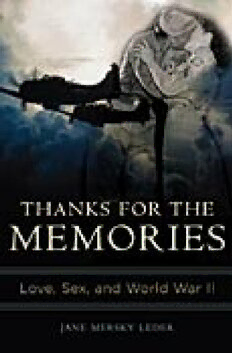
Thanks for the Memories: Love, Sex, and World War II PDF
241 Pages·2006·3.792 MB·English
Most books are stored in the elastic cloud where traffic is expensive. For this reason, we have a limit on daily download.
Preview Thanks for the Memories: Love, Sex, and World War II
Description:
Thanks for the Memories destroys the historical myth that young men and women went about the business of war and stayed on the straight and narrow path. Rather, World War II provided new opportunities for sexual experimentation, for hasty marriages, for flourishing prostitution—and for love connections that have stood the test of time. Young men in the military, far away from family and home, did things they might never have done. Young women, many of whom went to work for the first time, experienced a freedom and independence most women had never known. Because of the war, courtships were cut short, couples married more quickly than normal, and husbands and wives were often separated for several years. Despite attempts to get back to normal after the war and the apparent togetherness of the 1950s, World War II had set change in motion, heralding the second wave of the women's liberation movement.The collective consciousness of World War II revolved around the virtues of bravery, sacrifice, and commitment. Members of The Greatest Generation toed political and social lines in hopes of winning the war. They fell into lockstep, asking very few questions, and breaking few social and sexual mores. Or did they?In fact, World War II was—like all wars—a time of sexual experimentation and a general loosening of morals. It was a time of conflicting emotions and conflicting messages, a time of great sacrifice, and a time of discovery, when some groups, especially woman, experienced a relaxing of bonds that had kept them in check. Thanks For The Memories: Love, Sex, and World War II the true story of how the World War II generation responded to the passions of war, and how those passions changed their lives-and the relationships between the sexes-forever. But this book is more than that. As Jane Mersky Leder writes, Thanks for the Memories opens the hearts and memories of a generation that is dying, by one estimate, at the rate of more than 1,000 a day. It exposes the sexual and romantic escapades of The Greatest Generation and underscores how those four war years revolutionized relationships (including those between gays), and how it helped set the stage for the second wave of the women's liberation movement. Many who never thought their stories mattered, Leder writes, now feel the pull of limited time, and the importance of leaving an accurate account for their children and grandchildren of what it was like to be a young man or young woman during World War II. This is their collective story.
See more
The list of books you might like
Most books are stored in the elastic cloud where traffic is expensive. For this reason, we have a limit on daily download.
